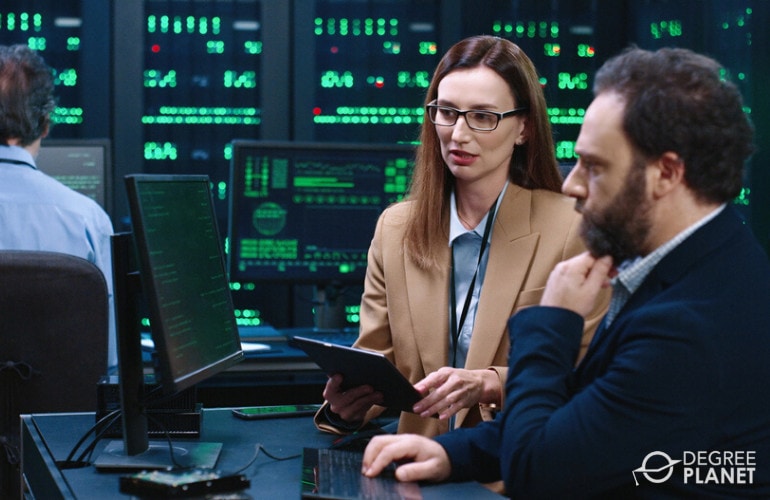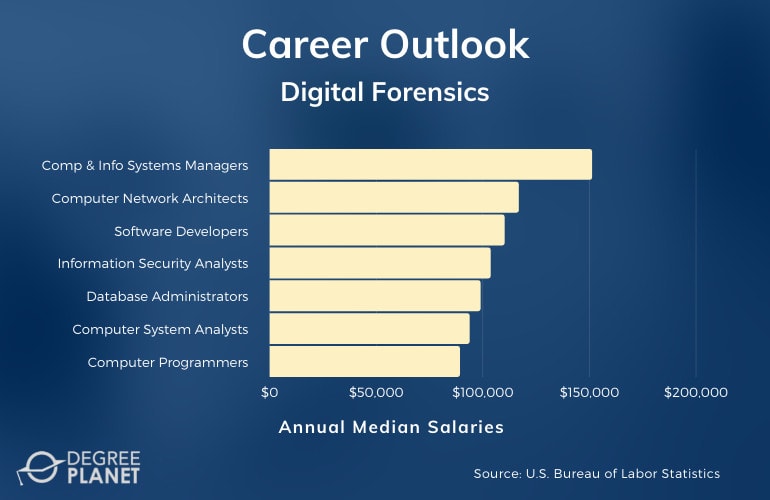Is a digital forensics degree worth it? Digital forensics is a subfield of forensic science. Forensic scientists can analyze the evidence from crime scenes, and their findings often aide investigations and the prosecution of criminals.

Digital forensic scientists help investigate digital crimes or digital evidence across a wide variety of devices, such as phones and computers.
Editorial Listing ShortCode:
Earning a degree in this field can also help you develop a marketable skill set that can open up career opportunities in various industries.
Is a Digital Forensics Degree Worth It?

Yes, a digital forensics degree is worth it for many students. Digital crimes, including fraud, remain at record highs. A cybercrime is a crime that involves a computer and a network. This can include identity fraud, financial theft, data theft, and cyber extortion, which is a form of bribery.
Because digital crimes are increasing, there is an even greater demand for digital forensic scientists. A degree in digital forensics can help you develop the technological skill set for this growing field.
Organizations and businesses in nearly every industry need experts to prevent hackers from stealing important information. They also need digital forensic scientists to help them recover from cyberattacks.
Editorial Listing ShortCode:
Banks and financial institutions, along with the medical industry, have been making the move to electronic information systems, so they’re in need of tight security. The Bureau of Labor Statistics projects 31% job growth for information security analysts and 14% job growth for forensic science technicians over the next ten years.
So, if you have an interest in computers and criminal investigations, you might consider earning a degree in digital forensics.
How to Decide Whether a Digital Forensics Degree Is Right for You

Most digital forensic scientists enjoy working with computers and investigating crime. But beyond that, how can you tell if a digital forensics career is right for you?
A digital forensics degree program can teach you most of what you need to know, such as communication skills and cybersecurity fundamentals. A forensics program will also include some courses on law and criminal investigation.
There are some skills, though, that most digital scientists just seem to naturally possess. While you can learn these skills in a degree program, a digital forensics degree may be a good fit for you if you already have the following aptitudes.
1. You have technical aptitudes.

Digital forensics jobs are technologically focused. Most digital forensic scientists work across a variety of technologies and operating systems, from computer to mobile. It’s necessary to be able to quickly identify and respond to security breaches and network hacks.
2. You have a good attention to detail.
Digital forensic scientists can act as investigators of sorts. They can sift through endless amounts of data and digital evidence. They need to be thorough and have a sharp eye for detail.
3. You think analytically.
Forensic scientists are also great analytical thinkers. When it comes to analyzing evidence, they must be observant and able to identify patterns and discrepancies. They also need to interpret the data they’ve collected.
5 Things You Can Do with a Digital Forensics Degree

A degree in digital forensics can open up a variety of job opportunities. Some professionals work in organizations that are susceptible to security breaches, but there are many career opportunities in law enforcement agencies.
1. Computer Forensic Investigator
Computer forensic investigators are known by many different names, such as computer forensic specialists or computer forensics examiners.
Computer forensic investigators uncover the information contained on digital artifacts. They can work with governments at the local, state, federal and international levels. They can also work with law enforcement and private investigation firms.
2. Computer Forensic Technician

A computer forensic technician is more like a digital detective. Their job is to gather, analyze, and even preserve digital evidence.
Computer forensic technicians may also prepare extensive DNA analysis reports and even appear in court to report their findings. Professionals in the field can work in accounting firms, law firms, banks, software development companies, and government agencies.
3. Computer Forensic Analysts
Computer forensic analysts assist in cybercrime investigations. They often work to recover deleted, encrypted, or other hidden information related to a case. They also protect the data to make sure it’s admissible in court.
Editorial Listing ShortCode:
Computer forensic analysts may also advice law enforcement and prosecuting attorneys on the validity of their evidence. A computer forensic analyst can work full-time for one organization, such as a software company, law firm, or accounting firm. They can also work for multiple companies on a contractual basis.
4. Information Security Analyst
While computer forensic technicians and investigators work with an agency or organization after a cyberattack, information security analysts work with organizations before the cyberattack takes place.
Their job is to protect computer networks by installing firewalls and other security software. Many information security analysts work for computer companies, businesses, financial companies, or consulting firms.
5. Security Consultant

Security consultants also work to prevent cyberattacks from happening. A security consultant analyzes the computer system within an organization to look for weaknesses and potential breaches.
Once a threat is identified, they may present an improvement plan to the owner or management and then oversee the implementation of the new security measures. Security consultants can work with a single company or consult for multiple clients.
Digital Forensics Degree Alternatives

Most careers in digital forensics require a bachelors in computer forensics or digital forensics. There are other degree paths, though, that can lead to working in cyber forensics or a similar field.
- Bachelor’s in Cyber Security. Cyber security focuses on preventing digital crimes from happening. A bachelor’s in cyber security prepares students to identify, evaluate, and defend against security threats.
- Bachelor’s in Computer Science. A bachelor’s in computer science trains students to develop computer software, write code, and solve computing problems. This degree program can also help prepare students for a career in coding.
- Bachelor’s in Computer Engineering. Computer science focuses on data and algorithms while computer engineers focus on hardware and firmware. Engineers work on solving computer security problems and developing both hardware and software interfaces.
It can be helpful to compare different degree options to determine which one best suits your interests and career goals.
Digital Forensics Careers & Salaries

According to the Bureau of Labor Statistics, the median salary for computer and IT occupations is $91,250.
| Careers | Annual Median Salaries |
| Computer and Information Systems Managers | $151,150 |
| Computer Network Architects | $116,780 |
| Software Developers | $110,140 |
| Information Security Analysts | $103,590 |
| Database Administrators | $98,860 |
| Computer Systems Analysts | $93,730 |
| Computer Programmers | $89,190 |
| Network and Computer Systems Administrators | $84,810 |
| Police and Detectives | $67,290 |
| Forensic Science Technicians | $60,590 |
The skills you learn in a digital forensics program can also be applicable in a variety of positions in the computer science field.
What Is Digital Forensics?

Digital forensics is a subfield of forensic science. Digital forensics involves recovering and investigating digital data used for criminal activity.
Digital forensics can be broken down further into the following areas:
- Computer forensics
- Network forensics
- Forensic data analysis
- Mobile device forensics
Digital forensic investigators aim to stop hackers from committing cybercrimes. They try to protect an organization’s computer system from being hacked in the first place. If there is a breach, they assist in the recovery of stolen data, investigate the attack, preserve the evidence, and prepare a report for court to assist the prosecuting attorney.
Is Digital Forensics a Good Career?

Yes, digital forensics is a good career for many professionals. According to the Bureau of Labor Statistics, demand for forensic scientists and information security analysts is expected to be very high.
As the rate of cyberattacks increases, the need for digital scientists to investigate and prevent future attacks also increases. The top industries hiring information security analysts include computer system design, finance, insurance, and management.
Editorial Listing ShortCode:
Information, finance, and insurance industries also pay the highest. The median salary for information security analysts in the information industry is $107,310 (Bureau of Labor Statistics).
What’s the Difference Between a Certificate vs. Degree in Digital Forensics?

While most employers prefer a bachelors degree in digital forensics, this isn’t always necessary.
Bachelor of Science in Digital Forensics:
- Common requirement for many employers
- Can often earn twice as much as those with only a certificate
Certificate in Digital Forensics:
- Can be combined with a degree in a similar field, such as criminal justice
- Can allow you to further specialize in a certain field of digital forensics
Whether you pursue a degree or a certificate will depend on what you hope to accomplish in your career and with your current education level.
What’s the Difference Between Digital Forensics vs. Cyber Security?

Digital forensics is not cyber security, but there is overlap between the two. Both of these fields work to protect digital assets and intelligence. Both digital forensics and cyber security specialists are in high demand and can be employed in nearly every industry.
- Digital forensics: Digital forensics deals with the aftermath of a cyber-attack. Specialists find the source of the attack and recover any lost data.
- Cyber security: Cyber security specialists focus on preventing cyber attacks.
As businesses go electronic, the importance of securing systems and the rate of cyber attacks have both increased. This has led to a surge in demand for both security and forensics.
Getting Your Digital Forensics Degree Online

If you enjoy working with computers but also love the challenge of either preventing or investigating crimes, you might consider a degree in digital forensics.
Digital forensics intersects technology and forensic science. This type of work can deal with multiple technologies within a wide variety of industries. Online digital forensics degree programs, whether it’s a bachelor’s, master’s, or even a PhD in Forensic Science online, can allow you to earn your degree according to your own schedule.
Some forensic degree online programs, including online computer forensics degrees, also offer part-time options or accelerated tracks.
If you’re interested in joining this lucrative, growing field, you can start exploring accredited digital forensic programs today.

